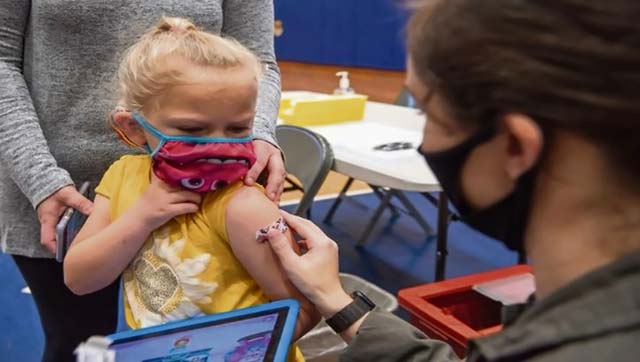
The COVID-19 pandemic drove the largest drop in childhood immunizations worldwide in 30 years, and health officials are urging parents to make sure their children are up to date on their shots as they return to more normal routines.
“Due to the COVID-19 pandemic, children have fallen behind on their immunizations in the Unites States and globally, increasing the risk for disease outbreaks,” said family nurse practitioner Donna Hoffman with the North Atlantic Region Vaccine Safety Hub-Defense Health Agency Immunization Healthcare Division (DHA-IHD).
“Staying up to date on childhood immunizations is essential to optimizing protection against diseases such as measles, hepatitis, pertussis (whooping cough), chicken pox, and tetanus,” she said.
The good news: “If your child has fallen behind on immunizations, they will not need to restart a vaccination series,” Hoffman emphasized.
For COVID-19 vaccinations, here are the current age require-ments: https://www.health.mil/News/Articles/2022/08/10/Age-Requirements-for-COVID-Boosters
Why are Immunizations and Boosters Necessary?
Vaccines are crucial to keeping our children healthy and avoiding an illness that can impact their daily lives.
“If we got the initial doses of a vaccine to protect us from a disease, it only makes sense to keep that protection at the best level possible through the recommended schedule for booster doses,” said Dr. David Hrncir, regional medical director, Central Region Vaccine Safety Hub, DHA-IHD.
Keeping our military kids up to date on vaccinations also benefits our readiness to serve.
“Adults can suffer from vaccine-preventable childhood diseases, just like kids,” Hrncir said. “Repeated exposure to your kids with childhood diseases can test your body’s ability to avoid becoming ill. While sick, your force protection readiness is degraded.”
How DHA Can Help
If you use your local military hospital or clinic, contact the immunizations staff for availability of vaccines and instructions on getting appointments or walk-in hours. Beneficiaries enrolled in TRICARE Prime
A managed care option available in Prime Service Areas in the United States; you have an assigned primary care manager who provides most of your care.TRICARE Prime or TRICARE Plus
A limited primary care program available at some military hospitals and clinics.TRICARE Plus at their local MTF have priority. All others may use the clinic on a space-available basis.
For those who use the TRICARE network, review information on covered services for both military medical treatment facilities and immunization clinics by state, as well as information on how to obtain immunizations through a TRICARE-authorized provider or a network pharmacy: https://tricare.mil/CoveredServices/IsItCovered/Immunizations
State immunizationCDC webpage laws may vary for public and private schools, but four common childhood vaccines are required for entry into kindergarten in almost every state: diphtheria-tetanus-pertussis, measles-mumps-rubella, polio, and varicella (chicken pox).
Children who are traveling overseas or making permanent changes of station under military orders may require accelerated schedules or additional immunizations for diseases that are present in that area, Hoffman said. These diseases include Japanese encephalitis, yellow fever, and typhoid.
Parents can check with their local immunization clinic or the Centers for Disease Control and Prevention’s travel health siteCDC webpage for additional information.
Resources
Health.mil, the official website for the Military Health System, main–tains an im-munization health care site (https://www.health.mil/Military-Health-Topics/Health-Readiness/Immunization-Healthcare/National-Immunization-Awareness-Month) providing information on child-hood immunizations, including links to the CDC’s immunization schedules that describe the exact immunizations your child, tween, and teen should receive at different ages.
“It takes into account your child’s immune system’s maturity, and the risk of exposure to a particular disease in each age group,” Hoffman explained.
“For that reason, delaying immunization can leave your child unprotected which can have serious consequences not only for your child, but also for those who may be more vulnerable due to age or a weakened immune system.”
Vaccines can also protect tweens, teens, and college-age kids from common diseases, including meningitis, which can “spread easily in close communities like college dorms and social gatherings,” Hrncir said. The CDC adult scheduleCDC webpage for immunizations is a good reference for your high-school and college-age kids 18 and older.
Additionally, children ages 11 to 12 can get the vaccine that prevents certain human papillomavirusCDC webpage-related adult cancers, Hrnicr said.
Other immunization resources include:
- National Immunization Awareness Month
https://www.health.mil/Military-Health-Topics/Health-Readiness/Immunization-Healthcare/National-Immunization-Awareness-Month - MHS’ Back-to-School Toolkit
https://www.health.mil/Military-Health-Topics/MHS-Toolkits/Preventive-Health-Toolkit/Back-to-School - Getting Your Baby Vaccinated
https://www.cdc.gov/vaccines/parents/schedules/reasons-follow-schedule.html - Why Vaccines are Important
https://www.cdc.gov/vaccines/imz-managers/coverage/schoolvaxview/groups/parents.html - Keeping Vaccination Records and Why
https://www.cdc.gov/vaccines/parents/records/find-records.html - Military parents can contact the DHA’s 24/7 Immunization Healthcare Support Center at 1-877-GETVACC (1-877-438-8222) for assistance.


